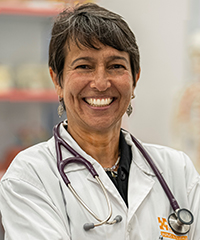
Joia S. Mukherjee, M.D.
Dr. Mukherjee is associate professor of medicine in the Division of Global Health Equity, Department of Medicine, Brigham and Women's Hospital, and associate professor of global health and social medicine at Harvard Medical School. In the Department of Global Health and Social Medicine, she directs the Master of Medical Sciences in Global Health Delivery program and the Program in Global Medical Education and Social Change. She teaches infectious disease, global health delivery and human rights to health professionals and students from around the world. Dr. Mukherjee has helped to create new residency and fellowship training programs for Rwandan and Haitian physicians as well as global health residencies and fellowships for US trainees at Harvard and other American universities.
Dr. Mukherjee is a graduate of the University of Minnesota Medical School, trained in infectious disease, internal medicine, and pediatrics at the Massachusetts General Hospital, and has an MPH from the Harvard School of Public Health. Since 2000, Dr. Mukherjee has served as the chief medical officer of Partners In Health, a nonprofit medical organization focused on reducing global health disparities by strengthening health systems through public sector support and community-based programs. She provides strategic guidance on the implementation of clinical programs at PIH’s sites in Haiti, Rwanda, Malawi, Lesotho, Peru, Mexico, Russia, Sierra Leone, and Liberia and has served as an expert consultant for the World Health Organization and Ministries of Health on of HIV, TB, health systems strengthening and health work force development.
Dr. Mukherjee also serves on the board of directors for Village Health Works (Burundi) and Muso (Mali) and the Institute for Justice and Democracy in Haiti. She advises various grassroots organizations throughout the developing world in their work to deliver health care with a human rights based approach to the poorest of the poor.
Affiliations
- Division of Global Health Equity, Department of Medicine, Brigham and Women's Hospital
- Partners In Health
assistantocmo@pih.org
(857) 880-5100
Dr. Mukherjee’s scholarly work focuses on the provision of health as a human right and on the design, implementation, and evaluation of comprehensive health care in resource-poor settings. More specifically, Dr. Mukherjee’s work integrates the principles and practice of social medicine—proximity, reducing barriers through analysis and accompaniment, as well as deployment of history and social theories to understand and remediate health inequities. Dr. Mukherjee’s scholarship highlights the clinical innovation needed to build health systems capable of providing complex care in challenging environments. In 2001, Dr. Mukherjee and her team published a paper in the Lancet describing the first HIV treatment program in Haiti. Based on this work, Dr. Mukherjee was invited to be part of the WHO’s Strategic and Technical Working Group on HIV/AIDS and helped write the first international guidelines on the use of antiretroviral therapy. Similarly, Dr. Mukherjee’s work to demonstrate the feasibility and the scale-up of treatment for drug-resistant tuberculosis (DRTB) in Peru and Russia led to international changes. Dr. Mukherjee was asked to help write the national guidelines (in both countries) and to work with a small team at the WHO to write the first set of international guidelines on the treatment of DRTB. Dr. Mukherjee has authored journal articles, led protocol development, and written book chapters that are foundational in the field Global Health, particularly in the social medicine approach; including first-authored scholarship in the areas of HIV and MDR-TB and in senior authored work in the areas of mental health, Ebola, and maternal-child health. In the last two years, Dr. Mukherjee’s work has been focused on synthesizing these lessons to form a framework for the achievement of Universal Health Coverage (UHC) which is the critical component of the United Nations’ Sustainable Development Goal for health. In all, Dr. Mukherjee’s work is deeply rooted in social medicine—understanding the structural barriers to care and developing innovative solutions to address them. Infectious disease, since the time of Virchow has a clear link between the social and the biological. Dr. Mukherjee describes herself as a full time scholar and her work over the last twenty years as teacher, researcher and innovator hinges on a bio-social analysis.
Lancet
View full abstract on Pubmed
PLoS One
View full abstract on Pubmed
Ann Glob Health
View full abstract on Pubmed
Glob Health Action
View full abstract on Pubmed
Anthropol Med
View full abstract on Pubmed
BMJ Open
View full abstract on Pubmed
N Engl J Med
View full abstract on Pubmed
Glob Public Health
View full abstract on Pubmed
BMC Health Serv Res
View full abstract on Pubmed
BMJ Open
View full abstract on Pubmed